Star Trek returns to where it began — in more ways than one — in this week’s Star Trek: Discovery episode. Just as Spock revisits Talos IV, we as the audience are revisiting the events of the original Original Series 1965 pilot, “The Cage.”
The episode even opens with a “previously on Star Trek” sequence that features actual footage from that episode, the first time that footage from classic Trek has been included in a Discovery broadcast.
Where last week’s episode, “Light and Shadows,” felt like the fulcrum point shifting the second season from its opening act towards its conclusion, “If Memory Serves,” written by Dan Dworkin & Jay Beattie, and directed by TJ Scott, helps to propel the story onwards.
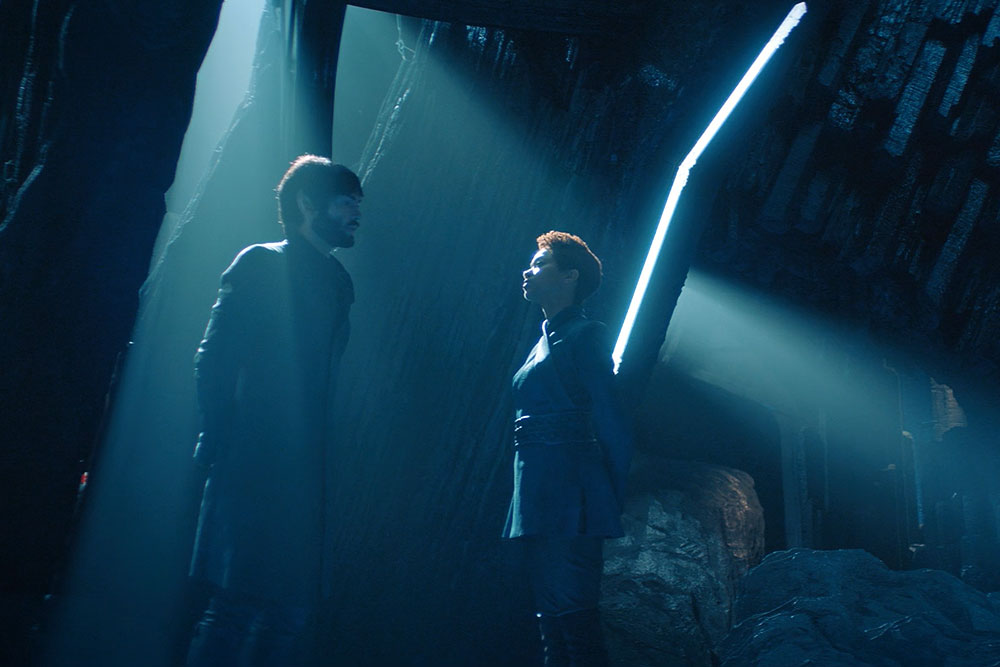
The episode is replete with connections to the wider Star Trek franchise, and it even provides us the answer to one of the season’s lingering questions: what caused the rift between the Sarek family children?
The episode’s opening recap, which provides some necessary context and background on the events of “The Cage” for new viewers, is perhaps a touch jaunty in its presentation given the heaviness of the events of “The Cage,” but it is so cool to see 1965’s Captain Pike (Jeffrey Hunter) dissolve into today’s Captain Pike (Anson Mount) to establish the continuity of the character. The “previously on” even works in universe as a moment of reflection by Pike on his experiences on Talos IV.
I must also say, the footage from “The Cage” looked phenomenally gorgeous. It was a confident move for this show not to rely upon some kind of forced re-telling by the Discovery version of these characters, but just to show the audience the original source material.
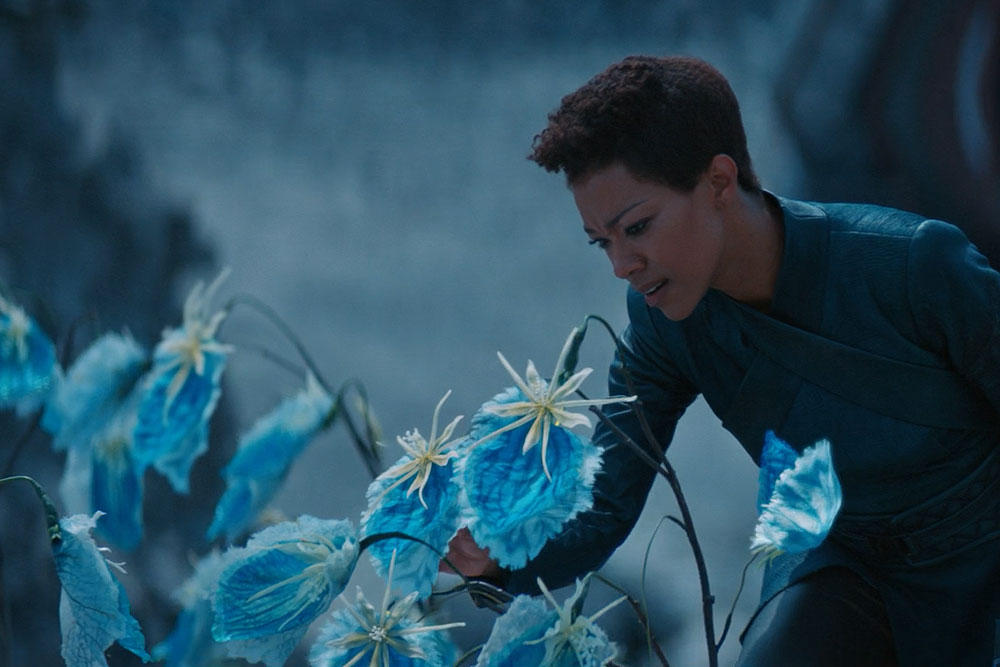
The Talos IV that Spock (Ethan Peck) and Burnham (Sonequa Martin-Green) find themselves on is a pretty faithful modern-day interpretation what we saw on screen in “The Cage.” Rocky terrain – check. Blue plants that give the atmosphere a high-pitched ringing sound – check. Telepathic aliens with big heads – check.
And Vina – check.
Perhaps one of the more obvious — yet somehow still unexpected — returning characters this season is Vina, the human survivor of the SS Columbia encountered back in “The Cage” (and seen again in reused footage during “The Menagerie) is back after 54 years, where Australian actress Melissa George reprises the role originated by Susan Oliver.
Kudos to CBS for keeping Vina’s appearance in this episode out of the advance promotional imagery and trailer for this week’s episode — unlike Wilson Cruz’s return in “Saints of Imperfection,” where Culber’s announced resurrection felt like a spoiler to many fans. Not expecting a return for the character definitely heightened the surprise when she was introduced.
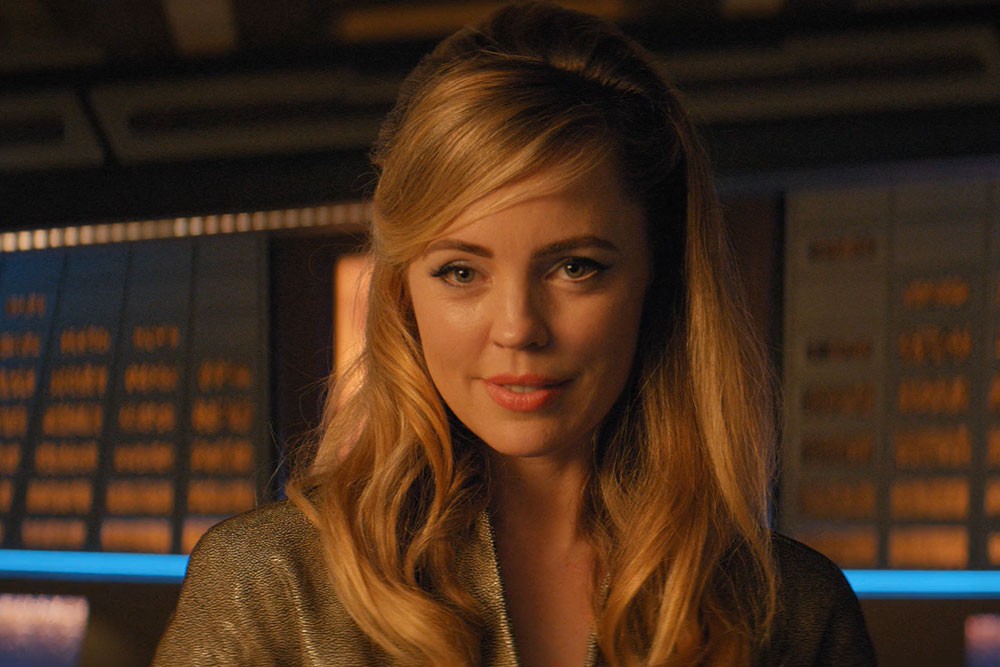
In “If Memory Serves,” Vina remains the primary conduit of communication between the Talosians and Burnham about Spock and his condition. The Talosians, led once more by The Keeper (Rob Brownstein) — as denoted by his special pendant — offer to help restore Spock’s mind to sanity, but only at the price of watching as Burnham relives the memory of her schism with Spock. She reluctantly agrees.
The Talosians look great – another very fine update to the makeup design (much like the Andorians and the Tellarites, both seen in this episode as well) that ultimately remains largely faithful to the original. The episode does seem, however, to intentionally sidestep the question of whether these Talosians share the diminutive stature of their 1960s counterparts. The way the episode is shot, their heights are ambiguous.
“The Vulcan is experiencing time as a fluid rather than a linear construct. Conventional logic has not helped him interpret such an experience,” the female Talosian (Dee Pelletier) tells Burnham, as the telepaths assist with returning Spock to sanity after his incoherent muttering from last week’s episode.
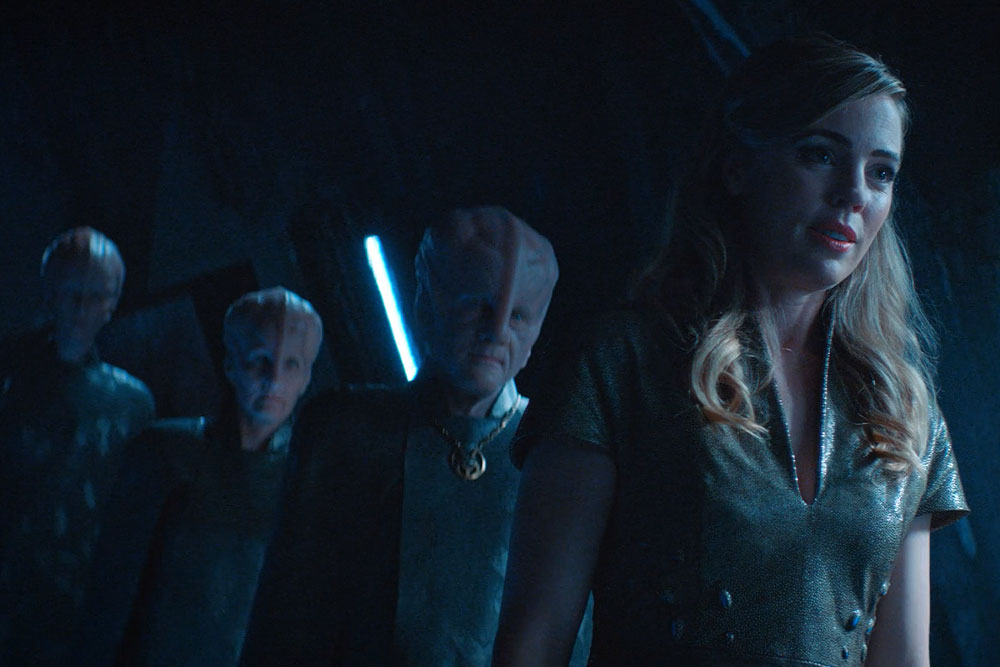
In the process, Burnham sees some of the visions that Spock has experienced – including the destruction of the founding homeworlds of the Federation (including Andoria, which looked quite similar to its appearance in Enterprise), and the fact that the Red Angel is human, though that’s the only new information we get about who’s inside that special suit.
We also learn that the Angel has already meddled with the timeline in one important and before unknown way for our characters: it saved Michael Burnham from death as a child when she ran away from home.
However, we still don’t know after this episode who the 28th Century aggressor race is that plans to destroy the Federation — though the technology we glimpse is very similar to the probe that destroyed the shuttle last week, and so they are connected to the Airiam subplot.
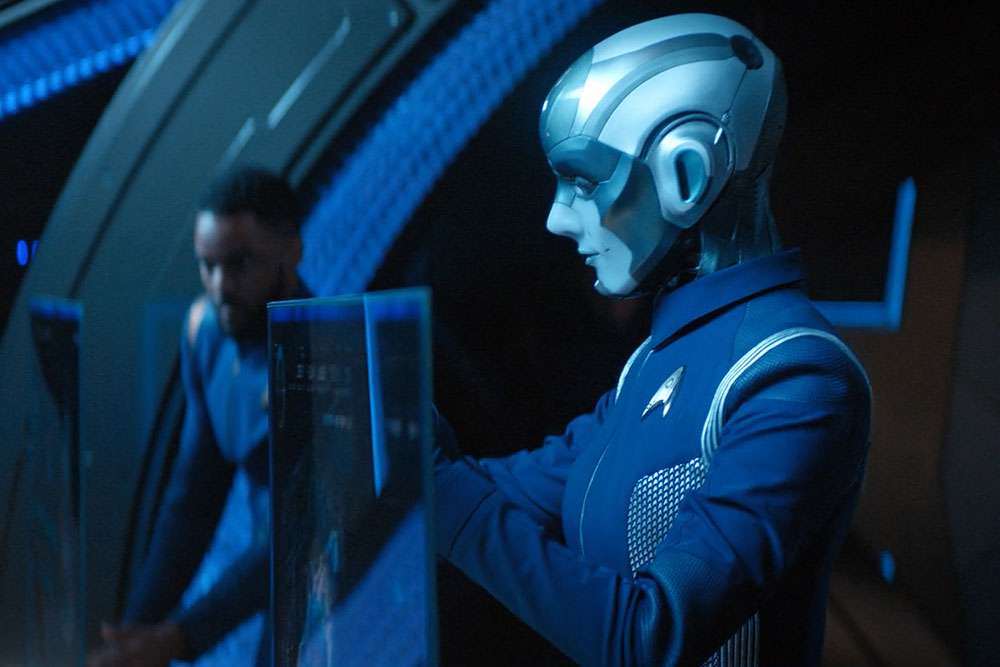
That did not bother me, though, as it felt like we continued to make enough progress towards the season’s conclusion in this episode that I was very content with what we did get. In discussing the red angel at the end of the episode, Burnham says “It appears this person is attempting to change the outcome of our current timeline,” to avoid what Spock calls “A future in which all sentient life in our galaxy has been eradicated.”
The stakes for this season are now clear, and we are getting a much clearer sense of the endgame.
This episode also gives us the opportunity to see the confrontation between Burnham and Spock that has been hinted at throughout the season, in which their relationship shattered and which created significant distrust between them. And the results are…sadly a little predictable. “I don’t want you in my life,” young Burnham (Arista Arhin) tells young Spock (Liam Hughes). “Stop following me, you weird little half-breed!”
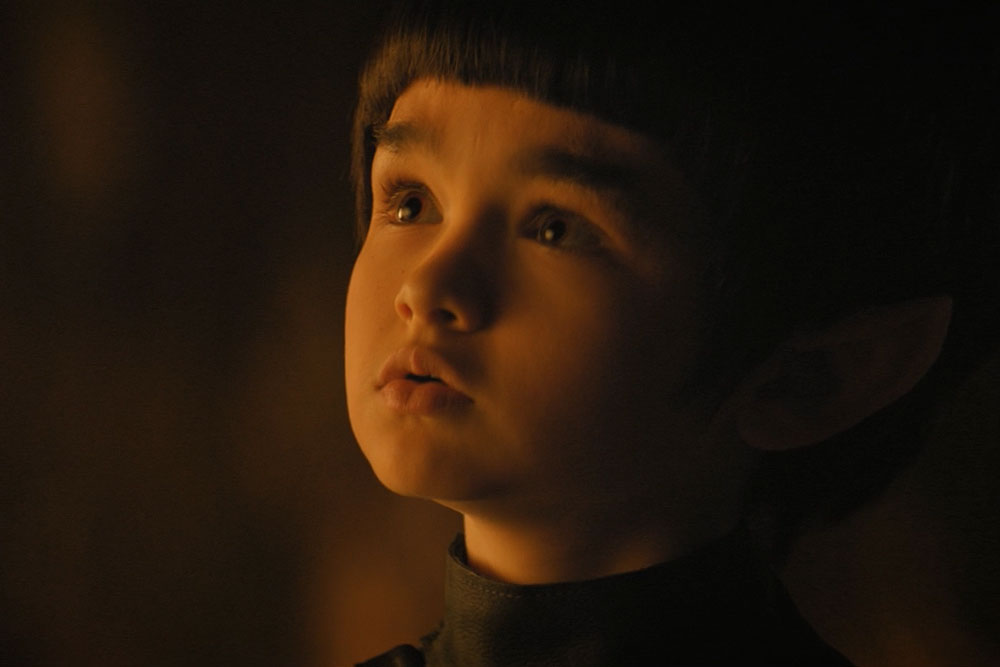
These insults, clearly not meant by Burnham but just used as a way of protecting Spock from her perceived threat of the Logic Extremists (as Spock acknowledges), were ultimately the most obvious answer to the question of why a split happened between the two. However, the way it is presented by using the child actors, which places these events in both characters’ early childhood – rather than later in life once they had developed more of a relationship – makes it feel a bit underwhelming.
If this scene had happened when the two characters were teenagers or young adults, after years of close friendship, I think it would have hit much harder and felt much more real and meaningful. But the way the relationship between these characters has been presented this season, using the same child actors from the season premiere makes it feel like this confrontation happened only shortly after the characters met.
The presentation and direction of the scene were really good, however, and largely overpower potential flaws in the plotting. The decision to swap in and out the child actors and their adult counterparts is very affecting – seeing Ethan Peck channel a young Spock who has his (only?) friend turn her back on him and the grief and shock of that moment was very impactful. Sonequa Martin-Green, and the young Arhin and Huges, also give the scene everything they’ve got.
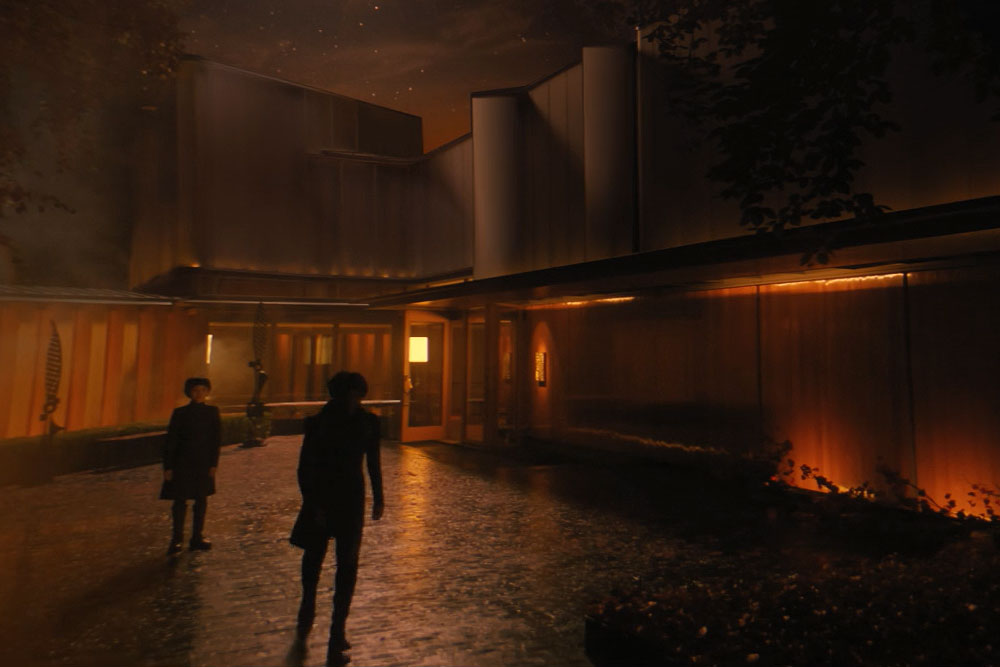
The result is that the scene itself is an emotional experience for the viewer, even if the ultimate explanation for the Spock/Burnham divide was a bit less substantial than it had been portrayed through the build up over multiple episodes.
After last week, we get a much better window into Ethan Peck’s performance as Spock, and it’s really good. Peck feels at time like he is channeling the spirit of Leonard Nimoy, and his preparation for the role, which included long hours watching the Original Series, was clearly a good investment of time (and not just because watching TOS is always a good investment of time.)
We also discover that, thankfully, Spock is not a killer – the story that he killed his doctors (including 12 Monkeys‘ Alisen Down, appropriate for this time-travel story) was apparently fabricated by Section 31, which Burnham learns when she experiences Spock’s memory of incapacitating his doctors who are not allowing him to leave.
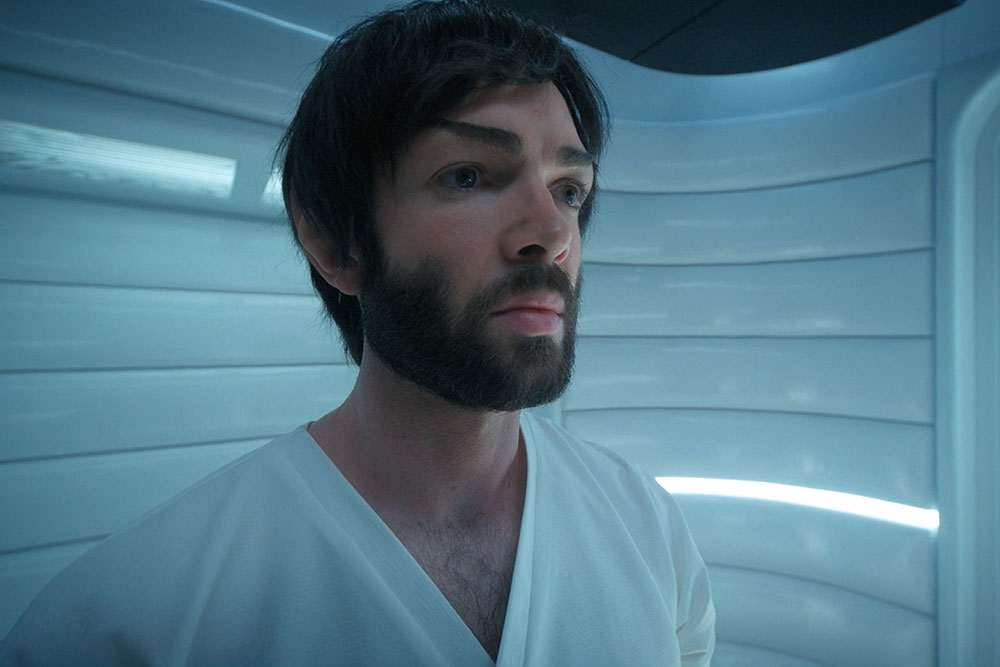
Discovery appears to be sketching out a broader arc for the Spock character that ties into classic Trek — rejected by Burnham as a child, Spock eschewed his human side. His later relationship with Kirk and McCoy, therefore, and the assistance they give him in becoming more comfortable and accepting of his human heritage becomes even more meaningful. Kirk helps to fix Burnham’s mistake – or at least that’s how it appears at this point.
Spock also shows a little trademark humor in this episode. I am so enjoying that Discovery is feeling freer to poke a little fun at itself. “Is there a valuable question in your arsenal?” Spock snaps at Burnham. “Yes,” she responds. “Do you actually think the beard is working?” she asks, to which Spock pensively touches his new facial hair. Hilarious!
In addition, there is a Star Trek IV: The Voyage Home caliber joke at the end of the episode with the “Say goodbye, Spock.” “Goodbye Spock,” interaction that leaves the viewer suspecting that Spock was in on the joke the whole time.
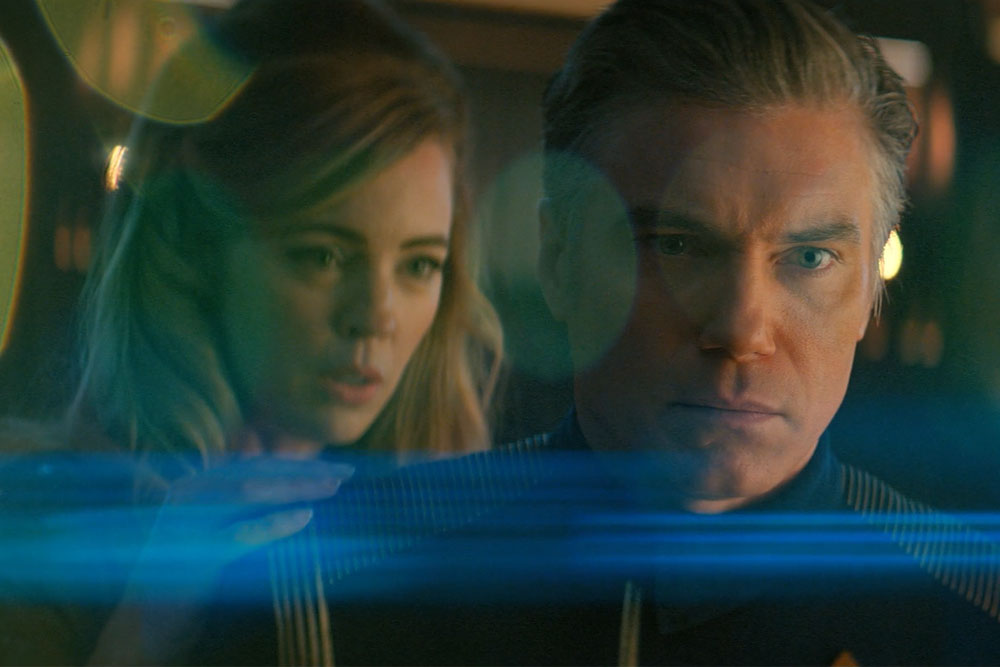
Bridging between the events on Talos IV and the events on Discovery itself is Captain Pike, who has several visions of Vina in this episode as she relays vital information back to the ship. “If Memory Serves” is the first episode this season in which it felt to me like Jeffrey Hunter’s depiction of Christopher Pike in “The Cage” and Anson Mount’s portrayal of the character were connected.
The Pike of “The Cage” was at such a different place in life – and had a bit of a different personality – that as much as I have been absolutely loving Mount’s Pike, it just didn’t feel like the same character.
This episode does a lot to wipe that away, as from the very first shot we see Pike brooding upon his experiences on Talos IV, and when Vina appears to him we see the complicated emotions that Hunter’s Pike displayed in “The Cage” – love, lust, anger, confusion. Even though Pike was largely ancillary to the events of this episode, it was still important for his character in helping us see the character’s evolution from the Enterprise’s first encounter with Talos IV three years prior.
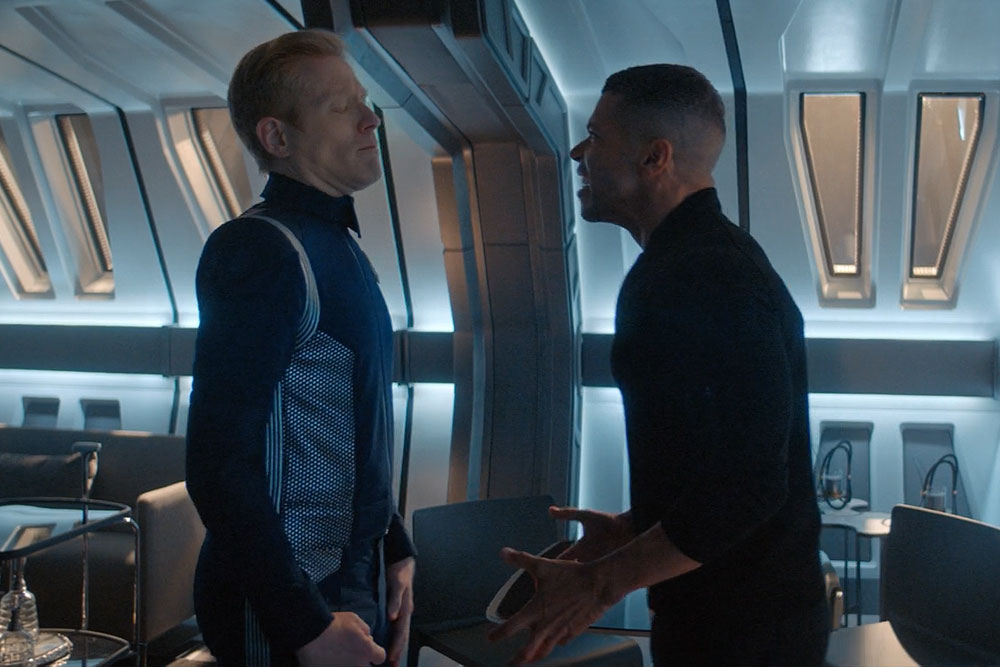
The other major Discovery-based plotline for the episode is several scenes focusing on Hugh Culber (Wilson Cruz). Following his resurrection in “Saints of Imperfection,” Culber has been having a very difficult time readjusting to his old life. While Paul Stamets (Anthony Rapp) is eager to pick things up where they left off, Culber is clearly dealing with a deep trauma that he is still coming to terms with, and does not seem to be able to fully articulate himself.
“You want me just to pick up where we left off as if nothing happened. You have no idea,” he says to Stamets after Stamets brought dinner to their quarters.
We also finally get to see the confrontation between Culber and Ash Tyler (Shazad Latif). This is the first interaction between the characters since Culber’s death, and interestingly, they now have something very much in common.
After their scuffle in the mess hall, which a newly emboldened Saru (Doug Jones) lets happen, Culber says to Tyler “I don’t even know who I am anymore.” “Who do you think you’re talking to?” Tyler responds quietly. These are both men who are feeling out of place in their bodies, and if there is to be any sort of reconciliation between them (though one seems both unnecessary and unlikely) perhaps that is where it lies.
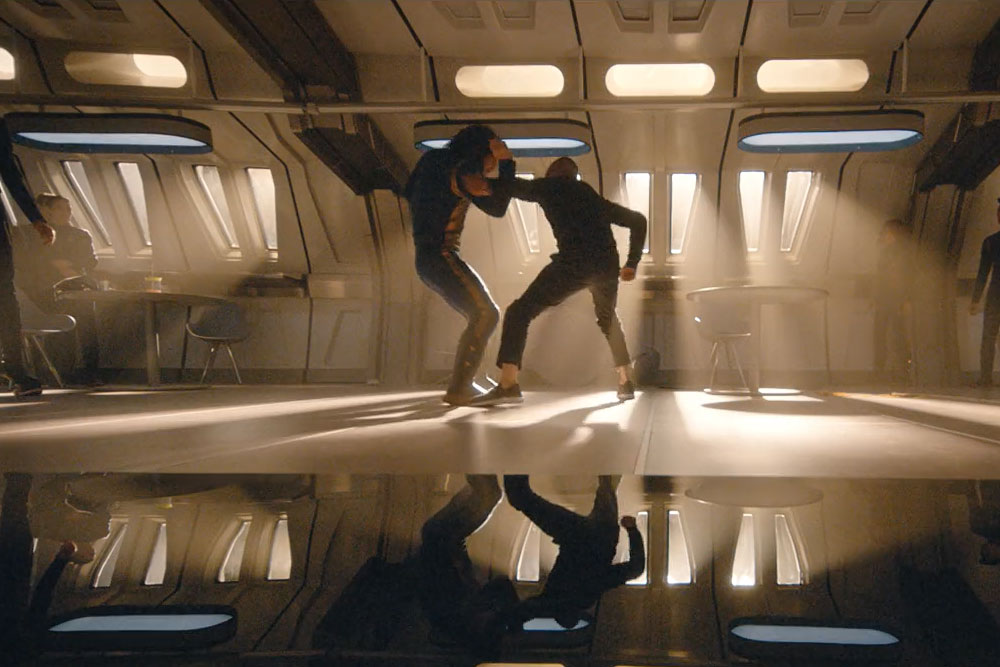
Saru sums up the situation to Pike with one of my favorite lines of the episode – “The Starfleet manual offers no guidelines for interactions between humans with Klingons grafted to their bones and a ship’s doctor returned from the dead.”
By the end of the episode, Stamets and Culber appear to have put their relationship on pause. “That version of me is dead. And I’m not going back,” Culber tells him. To Stamets’s credit, he appears to realize that Culber needs his space. Hopefully, this storyline is heading for a happy ending, but clearly that ending will not be immediate.
We spend a little time with Section 31 during this episode, as Leland’s (Alan Van Sprang) grip on power appears to deteriorate as Georgiou’s (Michelle Yeoh) is on the rise. There were two interesting things of note from these scenes: the admirals that Leland and Georgiou are conversing with at the episode opening are wearing standard Starfleet uniforms, including Vulcan Admiral Patar (Tara Nicodemo), Andorian Admiral Shukar (Riley Gilchrist) and Tellarite Admiral Gorch (Harry Judge).
They also appear to represent the four founding races of the Federation – humans, Vulcans, Andorians, and Tellarites; I wonder if that was an intentional choice.
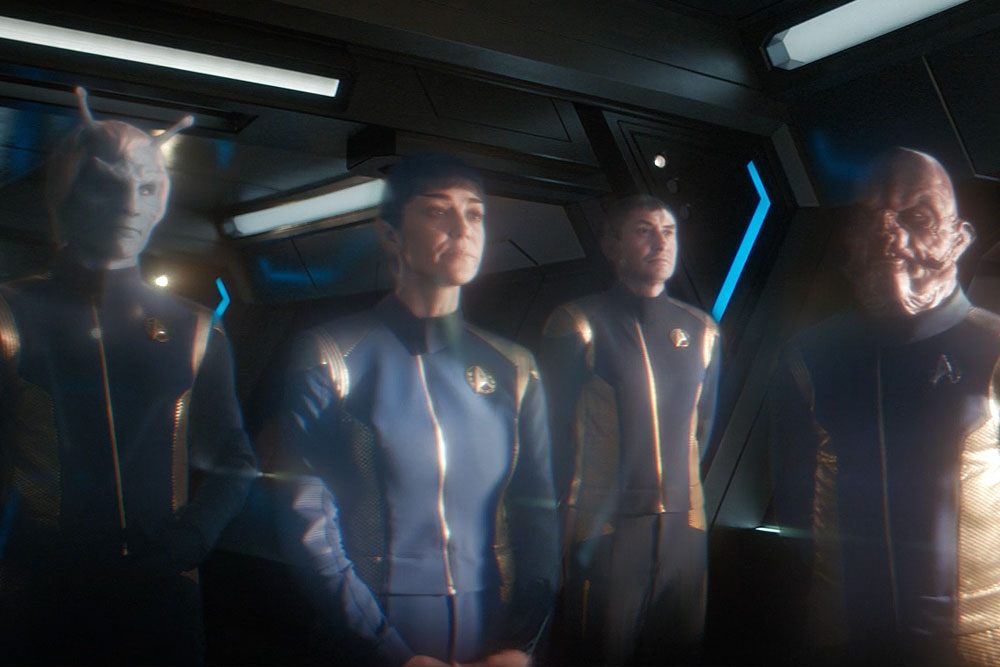
This episode also appears to further the notion that Discovery is borrowing a concept from the Star Trek novels. In several episodes, Leland and Georgiou have referred to “Control,” an unnamed person or entity that they are taking direction from. In the Section 31 novel of the same name by author David Mack, ‘Control’ is revealed to be an artificial intelligence that has been secretly guiding the activities of Section 31 and encouraging both the formation and continuation of the Federation.
In this episode, we seem to get confirmation that the canon Control is also an artificial intelligence, but in this case it is not a secret. “All this reliance on computerized threat analysis bothers me,” Georgiou says to Leland in exasperation. “In my universe the artificial intelligence took orders from me, not the other way around.”
I am thrilled that the Discovery writers room has borrowed this concept and made it canon. Section 31: Control is one of my favorite novels, and the idea that there is an artificial intelligence involved in determining the activities of Section 31 is a really fertile ground for storytelling that resonates with issues we are grappling with today.
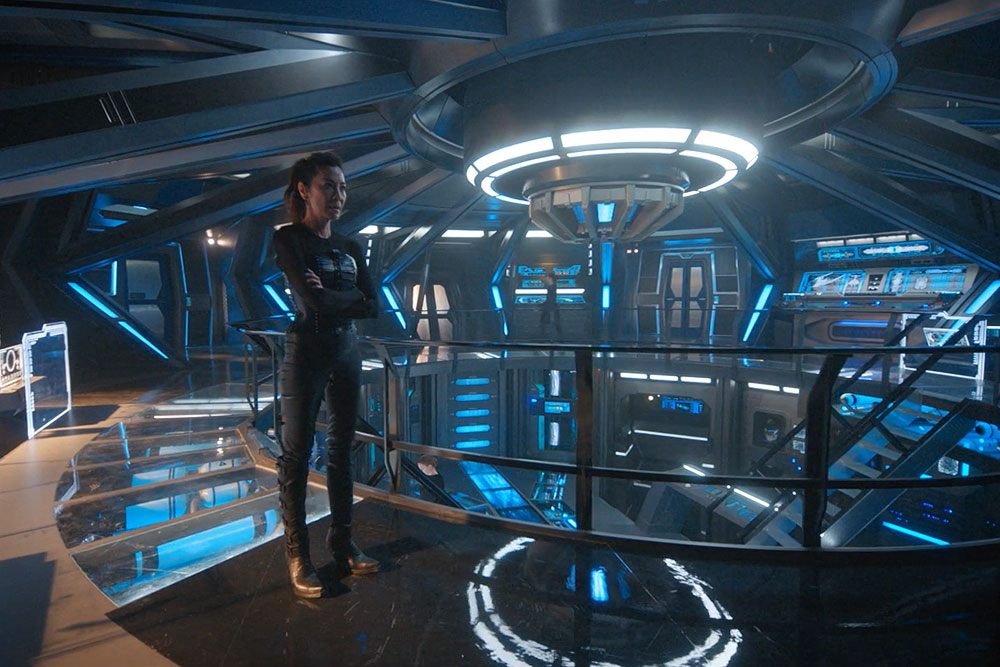
The rise of the use of artificial intelligence in our own lives raises a lot of questions, and what is Star Trek if not a mechanism to explore some of those questions?
With the Discovery now seemingly on the run from Section 31, the back half of season two is potentially headed in an interesting and unexpected direction. It is a confident move for the show to reach all the way back to the beginning of canon and create an entire episode that revolves entirely around the events of “The Cage.”
Viewers are entirely free to quibble with any aspect of this show and the story being told, but I think there’s one thing we cannot dispute after this episode: this entire production, from the writers’ staff to the production crew, demonstrate their love for Star Trek and they honor the franchise’s history. After all, we wouldn’t be back at Talos IV if they didn’t.
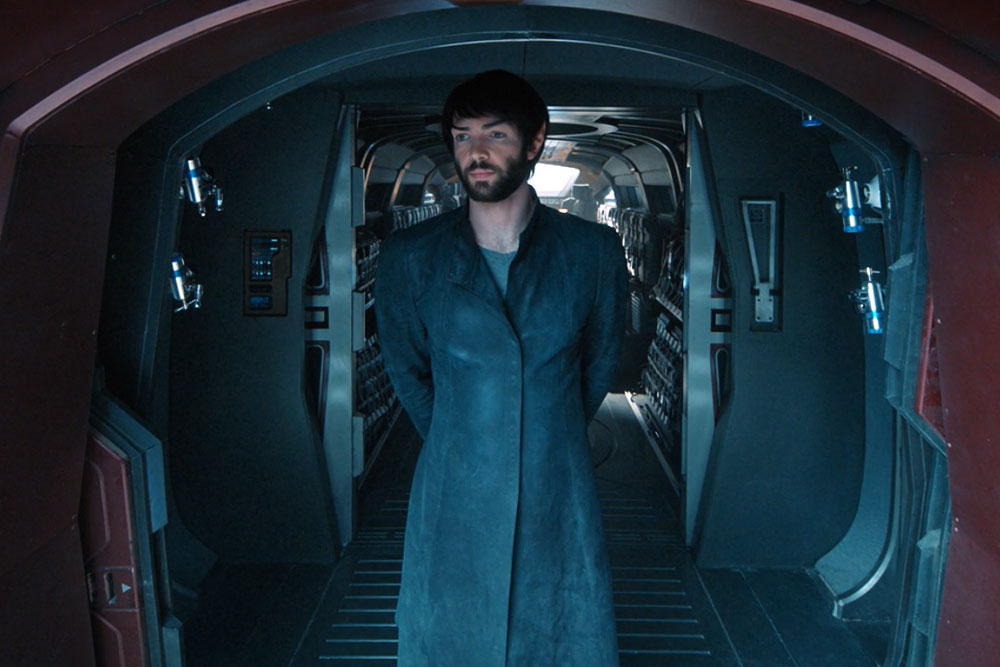
That’s it for “If Memory Serves,” now it’s time for your take on this week’s episode! Share your thoughts in the comments below, and then watch for more updates through next week as we approach “Project Daedalus,” the next episode of Star Trek: Discovery.
